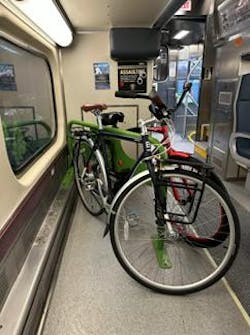Metra adopts Passenger Code of Conduct, set to permanently allow bikes on trains Feb. 1
On Jan. 17, Metra adopted a Passenger Code of Conduct and made permanent a COVID-era policy that allows bikes on all trains.
Passenger Code of Conduct
The Metra Board of Directors has adopted a Passenger Code of Conduct that identifies prohibited behaviors for anyone using Metra facilities or trains and allows for the suspension of riding privileges and/or confiscation of the fare media of passengers whose behavior threatens the safety of train crews, other employees and fellow riders.
The new Passenger Code of Conduct is in response to a law passed by the Illinois Legislature in 2023 that gives transit agencies the ability to act against riders who engage in certain conduct. Examples of prohibited conduct include:
- Verbally or physically threatening the safety of another person/others.
- Causing or attempting to cause physical harm to another person/others.
- Pushing or attempting to push another person/others.
- Hitting, kicking or attempting to hit or kick another person/others.
- Attacking or threatening to attack another person/others with a weapon, including, but is not limited to, waving weapons or pointing a gun at another person/others (regardless of whether the gun is loaded).
- Throwing or attempting to throw things at another person/others.
- Spitting on or attempting to spit on another person/others.
- Sexually assaulting or attempting to sexually assault another person or persons.
- Engaging in acts of public indecency.
“The safety of our riders and our workers is paramount and Metra intends to make full use of this new state law to make sure we are protecting both riders and workers to the best of our ability,” said Metra Executive Director and CEO Jim Derwinski.
If a person engages in any of these behaviors, Metra employees will contact Metra Police, who will issue a notice to the passenger and schedule a hearing date regarding confiscation of fare cards (or withdrawal of mobile tickets from the Ventra app) and/or suspension of riding privileges. Metra Police may also issue criminal citations, as warranted.
The hearings, which can be conducted in-person, remotely or by telephone, must take place before any suspension of riding privileges and/or confiscation of fare media occurs. Riders may waive their right to a hearing and ask the confiscation/suspension be imposed earlier. If fare media is confiscated and/or riding privileges are suspended after the hearing, the violators will have the right to up to two appeals. Suspensions can range from 10 days to one year. However, repeat offenses may result in lengthier suspensions lasting longer than a year.
If the fare media is confiscated, the value of any unexpended fare credit or unexpired passes will be reimbursed. Metra Police will keep a database of individuals and if they are caught riding during their suspension period, they may be arrested for criminal trespass.
“No transit employee should have to face an individual who has spit in their face, threatened their life, placed their hands on them or physically assaulted them. With Metra's new Code of Conduct, those acts, along with others, will now be cause for someone to lose riding privileges and repeated offenses can, and should, lead to lengthy suspensions,” said Bob Guy, state director for the SMART Transportation Division, the union that represents Metra conductors. “We thank Metra for working with SMART-TD on this new policy and will look forward to its enforcement to help with the safety and security of not only our members, but also the valued customers of Metra.”
“This law is long overdue and the first step toward protecting the men and women who work on board Metra trains,” said Edward Waugh, general chairman, SMART Transportation Division.
“I applaud Metra for adopting a new passenger code of conduct that will hold riders who assault Metra workers accountable and make it clear that riding Metra is a privilege, not a right,” said Brian Shanahan, vice president, Transportation Communications Union, which represents Metra front-line customer service workers. “Metra’s workers should never be forced to choose between doing their job and risking their life.”
Bikes on trains
Metra has also made permanent a COVID-era policy that allows bikes on all trains and said it was making room for additional bikes by installing new racks on its railcars.
Bikes have been allowed in the ADA seating area on Metra trains since 2005, but for most of that time, they were restricted to non-rush period trains. During the COVID-19 pandemic, when ridership plummeted, Metra relaxed that policy to allow bikes on rush period trains and now that change has been made permanent, effective Feb. 1.
In 2023, Metra notes 260,000 riders brought bikes on trains, the highest annual number ever – even higher than pre-pandemic years. To facilitate the growing number of cyclists, and to ease conflicts with ADA customers, Metra is manufacturing and installing new bike racks on its railcars in-house. The new racks, which can hold two to four bikes and can also be used to store e-scooters, will initially be installed on about 50 cars and those cars will be identified with an exterior bike logo and used on the trains that carry the most bikes.
The creation of the policy and installation of new racks was aided by bicycle advocates who lobbied the Metra Board of Directors, contributed to a working group that drafted the new policy and tested the new racks.
“We are truly grateful to the passionate cyclists who helped us change our policy for the betterment of all riders,” Derwinski said. “Metra and bicycles are natural partners and it is gratifying to solidify our relationship.”
Under the new policy, bicycles and scooters, including e-bikes and e-scooters, are permitted on all trains, either in the priority seating areas of ADA-accessible railcars or in the new racks on railcars with the bike logo. There is no charge.
Bicycle and scooter spaces are allocated on a first-come, first-served basis and customers with disabilities have priority in the priority seating areas on ADA-accessible railcars.
Customers with bicycles and scooters may be required to leave the train if ADA-accessible space is needed for boarding passengers with disabilities. Every effort will be made to accommodate customers elsewhere on the train before requiring that they leave. Crews have the right to refuse bikes and scooters if all spaces are filled or if ADA-accessible seating is needed for customers with disabilities.
Bicycles must be secured to the new racks with a built-in strap or the cyclist’s own strap or lock. In the ADA-accessible seating areas, bicycles must be secured to the lower rail of folding seats with long bungee cords or other devices supplied by the cyclist. Bicycles must be kept clean and free of dirt and grease while aboard Metra trains and must not present a hazard to other customers.
Other details of the policy include:
- Bicycles and scooters must not exceed 80 inches long and 30 inches wide.
- Bicycles, scooters and any connected equipment must be safely loaded and unloaded in a single trip without causing any hazard to the customer or others.
- Individual customers with bicycles or scooters must be at least 16 years old. Customers under the age of 16 must be accompanied by an adult to bring a bicycle or scooter.
- Train crews are not required to assist with boarding bicycles or scooters and the wheelchair lift may not be used to load or unload bicycles or scooters.
- Gas-powered bicycles and scooters are prohibited.
About the Author
Brandon Lewis
Associate Editor
Brandon Lewis is a recent graduate of Kent State University with a bachelor’s degree in journalism. Lewis is a former freelance editorial assistant at Vehicle Service Pros in Endeavor Business Media’s Vehicle Repair Group. Lewis brings his knowledge of web managing, copyediting and SEO practices to Mass Transit magazine as an associate editor. He is also a co-host of the Infrastructure Technology Podcast.

